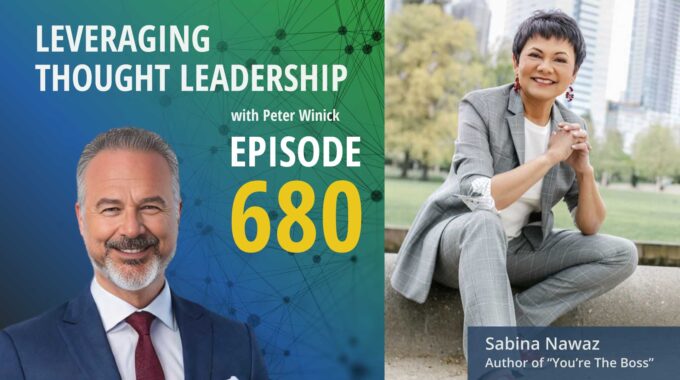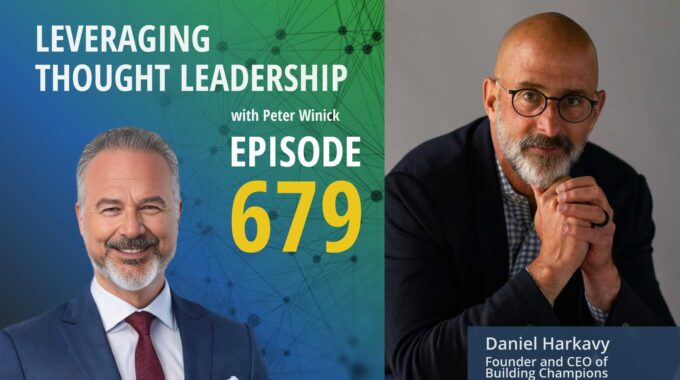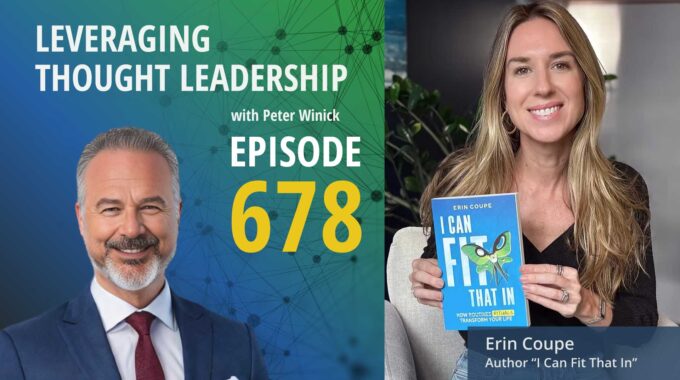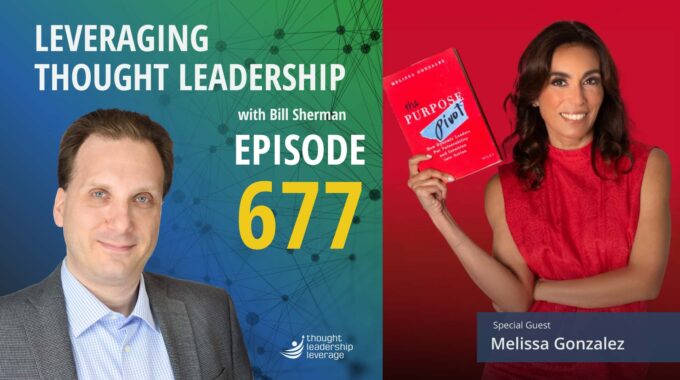The Hidden Cost of Corporate Pressure—and How Leaders Can Rise Above It This episode explores…
The Power of Saying Yes: How Curiosity Fuels Thought Leadership | Dan Ariely
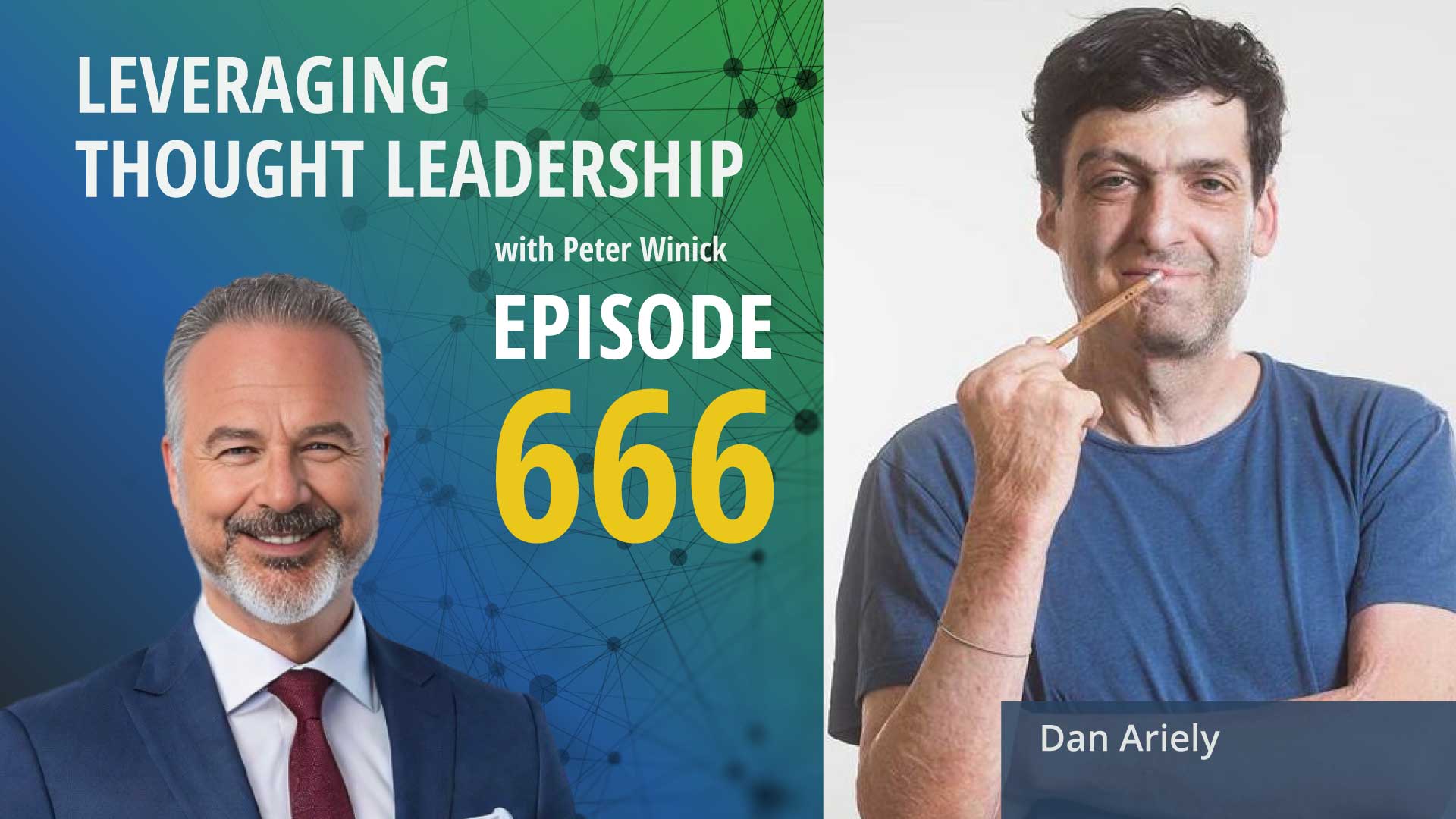
Exploring the Edges: How Big Ideas Create Lasting Impact
This episode explores how thought leadership thrives at the intersection of curiosity, experimentation, and storytelling. From rethinking end-of-life care to tackling social media and human decision-making, it reveals how identifying areas where humanity underperforms can create lasting impact.
What if gambling with your time was the smartest investment you could make as a thought leader?
Today on Leveraging Thought Leadership, host Peter Winick sits down with Dan Ariely—renowned behavioral economist, three-time New York Times bestselling author, and one of the sharpest minds in decision science. His work has influenced companies like Google and Apple, guided governments, and sparked movements in how we understand human behavior.
Dan shares why he doesn’t believe in rigid career paths but instead embraces intellectual adventure. His approach? Say yes to opportunities, experiment widely, and learn fast. From writing children’s books to advising on Middle East diplomacy, he treats each project as a test of impact and possibility. It’s thought leadership powered by curiosity, not by a fixed roadmap.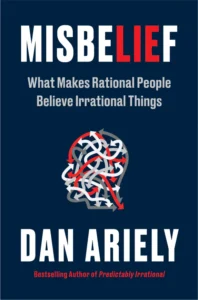
We explore how Dan chooses where to focus his time and energy—not on where the money is, but on where humanity is underperforming. Whether it’s helping people rethink end-of-life care, confronting our irrational use of social media, or tackling the psychology of sleep, his work points toward reducing suffering and increasing human well-being at scale.
What stands out is not just Dan’s research, but his method. He embeds himself in the world he studies. He spends Fridays with palliative care doctors and end-of-life doulas, visits slums to understand poverty, and listens deeply to those at the margins. For him, real thought leadership means turning lived experience into research-backed insights—and transforming those insights into powerful stories people remember.
This conversation is a masterclass in aligning expertise with purpose. Dan shows how storytelling, data, and empathy intersect to create impact. And he reminds us that luck isn’t found—it’s generated by saying yes, trying widely, and learning relentlessly.
Three Key Takeaways
- Gamble with your time wisely — saying yes to diverse opportunities creates luck, generates new insights, and fuels thought leadership.
- Focus where humanity underperforms — the biggest impact comes from tackling areas where society consistently falls short, like end-of-life care, social media use, or health behaviors.
- Turn research into stories — embedding in real-world experiences and translating data into memorable narratives makes ideas resonate and spread at scale.
If you found this episode thought-provoking, you’ll want to keep the momentum going with our conversation on organizational thought leadership in nonprofits with Marci Alboher.
Both episodes shine a light on how thought leadership can tackle the places where humanity underperforms—whether it’s rethinking end-of-life care and decision-making or changing the narrative around aging and intergenerational collaboration. In Dan’s episode, you’ll hear how curiosity and experimentation fuel insights that reduce suffering and spark change at scale. In Marci’s, you’ll discover how nonprofits can amplify voices, craft stories, and shift perceptions to unlock the untapped value of older generations.
Together, these episodes show how purpose-driven thought leadership—grounded in storytelling and human impact—can create real transformation. Listen to Marci’s episode next and expand your perspective on how ideas can drive change across both individuals and organizations.
Transcript
Peter Winick And welcome, welcome, Welcome. This is Peter Winick. I’m the founder and CEO at Thought Leadership Leverage. And you’re joining us on the podcast, which is Leveraging Thought Leadership. I am really excited today to have a guest that I’ve hoped to get on for. For a long, long time. So my guest today is Dan Ariely. If you don’t know who he is, you need to know who he is and you should have known who he is. He’s a New York times three times New York Times bestseller breakaway book was probably predictably irrational. An expert in behavioral economics. He’s worked with companies like Google, Apple, as well as a bunch of governments. And he has launched a bunch. Companies and is involved of amazing projects. Instead of talking about him, I prefer to talk with him today. So thank you, Dan. Thank you so much for coming on board today. Lovely. Lovely to be here. So how did this happen? Right. Amongst other things you teach at Duke. So that’s a logical, rational progression. But I would argue that the career, the, the path of most thought leaders is sort of somewhere between random and not linear and all that. How did, how did all this happen for you?
Dan Ariely So I had a terrible injury, right. Which is why I have half a beard and scars and so on. I became interested in helping people make better decisions. And I, and I took the academic path, okay. And I did undergrad and I did a PhD and I get another PhD. And then when I was in my second year at MIT as a faculty member, so no thoughts about anything, but the academic paths, right? Sorry. I’m very much.
Peter Winick The academic path. And that’s a hard path, even though it’s rational and linear, it’s not an easy path to become a tenured professor.
Dan Ariely It’s not an easy path, but it’s a very organized path, like, you know, what’s next. And then I have this meeting with Nicolas Negroponte, who was the head of the Media Lab. And, you, know, when academics ask you questions, they say, where do you want to publish or what do you to work on? And Nicolas asked me, how is your work going to be impactful? A different question, better question, very different question. And I told him, I said, look, the reality is I don’t have a good answer. Give me two weeks. And I went and I thought about what is this path of academic research publication and how does it make an impact? You know, we have this thing called we it’s what is your theory of change? How is the thing you’re going to do going to, and we, we always think about other things, what’s the, what the theory of change of, you know, education or whatever. And then I was okay. How, how is this academic? We’re going to have an impact. And then I realized that I need to change some things and I went and I talked to him about how, how it might do that. And the media lab was a very good place to be and he offered me a job at the, at the media Lab. And that was my first thought. So I didn’t plan on this. And I think if I didn’t have this really wonderful meeting with, with Nicholas, I don’t think I would have, I would’ve taken it. So that’s kind of f- You know, when you say, how do people decide on that career path for me? I didn’t decide it was random event. And then it, it did this. And then since then I’ve, I’ve done lots of other things. And, but it’s, it’s been about gambling with my time. Let’s say Nicholas tells me, you know, come and have an impact. And I start talking to more companies and start having an influence than I write a book. But then I started… Really looking for new adventure, new intellectual adventures. So, you know, somebody says, would you be interested in writing a kid’s book? Somebody says, would you try, would you want to join us and write a pilot for Hollywood? Say yes. And I try. Somebody says would you come to a meeting of all the Arab leagues about the future of the middle East? And I say, yes. So I, I basically say yes to lots of things. And I met through that, lots of fascinating people and had an opportunity to start lots of new, new projects. And My version of luck is that luck is something we do and luck is about generating lots of options, realizing we’re not smart enough to pick which one is good and which one is not, giving them all a fair shot, at least initially, and then cutting the things that don’t work and moving with the things that, that work. So from that perspective, when I say gamble with my time is I try lots of things, I take things that don’t work out and I stop them. I think they things that work out in and continue. And, um, and I have a very deep sense of adventure. So when things fail, I don’t feel bad about it. I’m happy. I tried it.
Peter Winick So let me ask you this. So you’re at a different stage in your career now than you might have been, say, 20 years ago. So the opportunity cost, not to throw an economics to right now, of gambling with your time is higher than it would have been. So I would imagine you have some set or some framework to say, these are things I definitely say no to. How do you analyze an opportunity or?
Dan Ariely So I, it’s one of my biggest flaws. So I have, I have rules for what they say yes to. Okay. I say yes, to everything that comes from hospitals or healthcare, because I’m, I owe a lot to the medical system. I always say yes. Governments, because I think governments can have a big impact. Okay. And I always says yes to things in Arab countries. And because I’m Israeli and Jewish, so if I’m invited to an Arab country, I feel this is my version of diplomacy. But what I say, so these are things I always say yes to, but no, I’m not good at this. I’m good at it. And when I say gamble with my time, I really mean it.
Peter Winick Minute, because as a thought leader, I get that response fairly often is I’m not good at this. And part of it could be a growth mindset, a sense of curiosity, a lifelong learner. Everything seems interesting, right? Everything seems like, ah, we could justify to ourself, yeah, this could be good outcome or whatever. And if the investment is quote, only your time, it’s fairly limited. Do you have different sets of criteria when you’re answering things that are taking more time? Like, hey, serve as a. A role in this company, invest your money in this startup or, or things of that.
Dan Ariely Yeah, so, so I want to add something else. I also had a deep sense of obligation. When people read one of my books and they have a question, I feel I started the conversation, they respond, I answer. I meet with lots of people in undergrad and so on. So in terms of my time, I do spread myself thin, I have lots of meetings, I don’t do well. In terms of things that take… Take, ah, I do have, I have one, one strategy that I recommend to people. Okay. I get lots of times when friends ask me for a favor, they say, Hey, you know, would you as a favor to me, would you help Joe? And my tendency for a long time to say friends ask. I always say yes, but then what I learned is I go back to the friend and I say, look, your friend, if something is important to you, I’ll do it, but let me know if this is really important. It’s amazing how many times they say, oh, no, no. It’s not really important. They just ask me. So I, so, so I, it just a little pre qualifier to say, I’m glad to do it. So they know you’re, you’re a friend, your friend really hear about you, but I just want to make sure that this is really high on your priority list. In terms of investments, I found a very simple rule. I found somebody else who is making those decisions for me. So I’m not good at it. I’m not good at it. I don’t know how to do so. So I, I outsource it. And in terms of, um, commercial things, I, no, I have my ideas that I try to push. Okay. And I usually, I usually work with companies for a while. Right. Of free with no commitment. Okay. Before I see there’s a real synergy. I’m- I’m not- At this, at this point, I’m looking for things where would be good for me and good for them. Yes. And I don’t want to, I want to date first. I love before committing to anything.
Peter Winick I wanna go back to when Predictably Irrational came out. So is that 20 years yet? Almost 20 years?
Dan Ariely In 2008, February, really good time for a book on Eurasian Alp. It was a financial, I didn’t plan it, but it worked out very well for this purpose.
Peter Winick 2008. Okay. So, so not quite 20 years ago. So interesting that the timing of the book pushed the book to a place it might not have gone before. It’s a very well written book, very well researched, great storytelling, et cetera. People were far more interested in the irrational nature of humans during the market crash of 2008. That being said, even though that, you know, we could say you were lucky that you should have sponsored the recession and paid for that or something. That opened lots of doors and opportunities for you, right? And elevated the brand and stuff. And it happened very quickly.
Dan Ariely And it was fantastic because people wanted to figure out things and I was kind of happy to help and then this happened and lots of people reached out and I got to help a lot. I also got access to data and funding for the research. So it created lots of avenues of positive impact. And I couldn’t have. I know you help people think about this in advance. For me, it was all one surprise after another.
Peter Winick Interesting. And it opened a lot of doors. So what is it, what are the things that as a thought leader, how do you determine? And I love the way you talk about gambling with your time. I could spend time writing about this or thinking about this, or thinking about that, how did you determine what’s sort of worthy of significant investments of your time and your energy relative to your thought leadership?
Dan Ariely So, so my analysis is I look at where I think that humanity is under performed. So I think we could perform here and we’re performing here. And so that’s the first question. So take different areas, stay there.
Peter Winick Minute, because a lot of, I love that answer, but a lot of folks are looking at it and say, well, where’s, you know, and you’re an economist, right? Where’s the biggest opportunity? How do I make the most money? That’s not where your head space is, which is so ironic.
Dan Ariely Well, so let me tell you the two elements and you’ll see. So, so I say, where, where are we underperforming? So underperforms in sleep and we under performing in hate and we underperform in spending time on social media and you can make a list of those things and then I say where are my specific skills connected because my, my goal is to take these big gaps and make them smaller. So for example, one of my big research projects these days is the last chapter of people’s lives. I’m thinking about the chapter from when people get diagnosed with terminal illness until the end of life, and it’s a very badly mismanaged chapter. It’s slightly more than five years on average from the moment of terminal illness diagnosis until end of live, and people basically accept the position of being a patient and they stop being people. Lots of things, but- want to die at home, but they die in hospital, lots of, lots of mistakes in that, in that chunk. That for me is kind of a very good place. Why we could be here. We’re here and we have created it. If you asked me to work on global warming, I would say social science can only do little bit things when you have policy makers and so on. This one, I can see the progress. I can see where we could move forward. So I take that topic and I do lots of things to try and understand it. I talk to palliative care physicians and there’s a physician here at Duke that I spend – when I’m at Duke, I spend Fridays with him with his patients. And I talk to veterinarians who do anesthesia to, I mean, they treat dogs to sleep. And I talked to about a hundred end of life doulas. I did the training myself to become an end of life doula. So I, I’m kind of trying to understand in different ways. Um, I helped a couple of people. Sure. I, I created the websites, the life we should live and people sign up. And I talk to lots of people who are on the verge or have a family member and so on. And I, I’m formulating my understanding.
Peter Winick If you’re enjoying this episode of Leveraging Thought Leadership, please make sure to subscribe. If you’d like to help spread the word about our podcast, please leave a five-star review at ratethispodcast.com/LTL and share it with your friends. We’re available on Apple podcasts and on all major listening apps, as well as at thoughtleadershipleverage.com/podcast.
Peter Winick Yeah, it sounds like it’s impact at scale, but through something that is bettering humanity, helping people, reducing suffering, whatever the, it is there. And I love the fact that, and you have to have the skills because a lot of people would like to change a lot things, but I think that there’s, they don’t ask themselves the question, why me? Could I add anything to this? I might wanna help this or end suffering here, hey, that’s not my skill set. Finding a place where your skills could be applied and you’re not, you know, being a doula, you’re helping lots and lots of people, but it’s limited, right? Whatever yours has the ability, because it’s an idea that’s putting out there. And I think a lot of people probably haven’t thought about God forbid I get this terminal diagnosis, is there a better way to spend those next couple of years that would increase my satisfaction, reduce the suffering of family and all those sorts of things. And you’re just fine.
Dan Ariely So for me, for me it’s this dual thing. Was there a big opportunity because I think we’re underperforming and where are my skill relevant and then I’m happy to explore it and like in the end of life space, I don’t exactly know where it leads me, but, but so I don, I don’t like have an outline of the book or yeah, yet I’m just, I’m just exploring it, but for me the exploration is also an important part. Bye! I go, I visit, I meet people. So in every area I do things, even if it’s on poverty, you know, I went to slums, I spent time, I…
Peter Winick Stay there a minute because now you don’t sound like an academic and I’m being sarcastic on purpose like a lot of academics will say well I’m gonna read the data X percent of people get done you know get this diagnosis and here’s the the cost to treat someone end-of-life is 80% of their medical care for you know poverty in this country is it and and they can quote the stats and whatever but not a lot of academics in bed and actually I’m you’re spending every Friday and You may determine in a couple months, this isn’t really a project for me or, or I’ve done the best I can. It’s not a book or whatever, but I love that level of, of embedding this quantum the qual.
Dan Ariely So first of all, it took me a while. I was a much more dogmatic scientist early on, but I’ll tell you, I’ll tell you my thought about it. I think that eventually we are a tool. Yeah. And we’re a combination of all the things that we’ve learned and try to organize. With science, there’s this magical process of coming up with a hypothesis, and then there’s a very rigorous process of testing it. But how do you come up with the hypothesis? And if you just read, you know, Excel spreadsheets or whatever, that initial process. So for me, I try to kind of get my own understanding. I say, okay, I want to understand ProvoTune. I want understand the end of life, I can’t do it by just reading. I need to, I need to make people understand and so on. And all of this is, is nourishing me. As a learning tool. Once, once I finished that, I could do very specific studies. Well, and that could be there.
Peter Winick Force a bias that you have or what you think the data is telling you or change it, right? The data might tell you one thing, but you might have a visceral response of being embedded in a poverty-stricken world or dealing with people that are actually at the end of the that change your thinking.
Dan Ariely That’s right. So I could be in Islam and kind of see something and then say why do people do it? Is this a real issue? Is this important? And so on. And then so and there’s lots of little nuances. I’ll tell you about something very strange, different. Oh, I’ll tell you about this. So, so I went to visit a brand center in Europe and they described to me two explosions that happened quite a while ago, one in Holland and one in Belgium. Yes. And eight years later, the people in Holland will find the Netherlands. The people in Belgium were not. Okay. Question is one. Now it turns out that people in the, in the Netherlands were all from a small village that works there. So people went to hospital, they went home. Everybody knew them. So they went out, they integrated back into life. Yes. In, in Belgium, the explosion happened in the train station. Okay. Everybody went to hospital, went to their homes, but they didn’t feel welcome to go out to the community. You know, you’re burnt, you look strange. It’s not easy. You’re the only one in your community afflicted with this. That’s right. They, they, people did not expect them, did not know it. And they basically don’t integrate back into. What an amazing observation. Now, is this enough for academic research? No, but it’s a, is it a really interesting starting point of saying, how do we, as people with disability define ourselves? How do we think about ourselves? How do you think about the reaction from other people? How do improve it?
Peter Winick And in that case, how would you educate the community to be more open, receptive, et cetera, to some?
Dan Ariely At the end of the day, you want people to have higher self-acceptance, the people with disability, which, by the way, this beard did a lot for me and this half-beard did a lot for my self- acceptance, and you need society to do stuff. But anyway, I have a lot of examples like this where I see things and they bring up thoughts and then you could take them to the next stage. And then, since we talk about thought leadership, I think It both adds to the credibility of people that they have seen things and struggled with them. Yes. At the end of the day, storytelling is useful.
Peter Winick So that’s where I was gonna go next with you as we start to wrap is that when I think about where people come from in terms of their careers and professions, et cetera, most social scientists, most academics are not great storytellers, period, full stop, right? They could make their case, they can make their point, they’re very thoughtful, analytical, they go through the data, whatever, but you read most of these academic journals and it’ll put you to sleep, right. I think one of the amazing things about all of your books is that there’s trauma and tension in the story that leads you to make it a page-turner. And then, of course, you’re taking away a lot of information that’s backed up by data. It’s not just a story, but being able to tell a story that’s back up by research and science and all that. That’s a gift, that’s an art.
Dan Ariely So, so first of all, thank you. I, I think that actually lots of academics are good storytellers, but they only do it in the classroom because we all, we all have kind of a split personality between how we talk to undergrads in the class room and how do we present professionally. And, and I think. There’s, there’s kind of, um, something in the, in the feeling of academics against that. But I think we do that. I mean, there are some people better, some people worse, but it’s not as if academics don’t have experience with it. It’s just that we have this view, oh, this is a presentation. It has to be in a nice and technical mode, yeah, yeah. Like, you know, the funniest thing is that we put, somebody’s worked for a year on some equation and then they put it on the slide. As you can see, it took you a year to come up with this. How do you hope that people would figure out by seeing it on this slide? But, but no, um… I think it’s very important. And the thing, the thing about anecdotes and stories, it’s about you want the principle and you want an example to make it, to make the people can remember and take, take it away. And I’ll, and I’ll tell you one other thing that I think is important. I think. It’s important when I look at what I’m trying to do for an audience. Is sometimes I try to give them a factor. Oh, I want you to think about the fact that people who are feel highly appreciated work hard better. Okay. Right. But I mostly want to give people a lens. I want to say, if you look at human endeavor from the perspective of motivation, yes, here is what you would see that you haven’t done seen before. If you will look at this through the perspective of our evolutionary history and how we make decisions, this will give you insight. So I think about lectures or books as a lens that is not just specific to the factoid. So you learned 10 things, but ideally it’s a lens from which to view other things.
Peter Winick And you could choose when to use which lens, depending on what you’re trying to get out of that. Well, I really appreciate your time and your transparency. And I’ve been a big fan of your work for a long, long time. And it’s great to hear the story is firsthand. I appreciate you, Dan.
Dan Ariely Thank you so much, and loved spending time with you…
Peter Winick To learn more about Thought Leadership Leverage, please visit our website at thoughtleadershipleverage.com. To reach me directly, feel free to email me at peter at thoughtleadershipleverage.com, and please subscribe to Leveraging Thought Leadership on iTunes or your favorite podcast app to get your weekly episode automatically.


